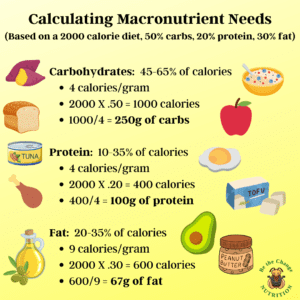Calculating Macronutrient Needs
What are macronutrients anyway?
Macronutrients are nutrients we need in large (macro) amounts.
These include: Protein, Fat and Carbohydrates. They provide calories.
Micronutrients are needed in smaller (micro) amounts and include vitamins and minerals. They do not provide calories.
Very specific grams of macronutrients aren’t something I usually put a lot of focus on in nutrition counseling.
But sometimes a client wants to know the number of grams of protein, fat and carbohydrates that is recommended for them.
A fair question for a dietitian!
How to calculate macros:
Step one is to determine approximately how many calories your body needs.
I use the Mayo Clinic’s Calorie Calculator:
https://www.mayoclinic.org/healthy-lifestyle/weight-loss/in-depth/calorie-calculator/itt-20402304
(Please know that this is not an exact science.)
Once you have your (estimated) calorie number, you can now calculate your macronutrient goals.
This will give you an idea of how many grams of each to aim for each day.
In my example I’m using a 2000 calorie goal with 50% carbs, 20% protein and 30% fat.

I went middle-of-the-road, but as you can see, there are ranges.
Carbs range between 225g-325g/day.
Protein ranges between 50g-175g/day
Fat ranges between 44g-78g/day
There is quite a bit of wiggle room.
⭐Most people’s normal diets naturally fall into these macronutrient ranges.
Should you be counting your macros?
There is no right or wrong answer.
Macro calculating can be a good learning tool to ensure that you are within the range of your needs.
If you’ve been following a specific diet like: low-fat, low-carb or vegan, and it’s not working for you, checking your macro balance can help you identify imbalances and make healthful changes.
But just because you’re eating within your macronutrient ranges doesn’t mean that you’re getting the micronutrients, fiber and phytochemicals that support health.
It also doesn’t mean that you’re eating foods that you enjoy and that make you feel good.
And if you’re trying to break away from all the counting and tracking you’ve done from years of dieting, this can just add too much stress.
It can feel restrictive, become overly consuming and trigger disordered eating.
If you’re looking to obsess less about food and eating, then this isn’t recommended.
If you’re curious about your macros, I am happy to help you calculate them.
But I’m not here to teach you to micromanage your diet through tracking and counting.
Nourishment, nutrition and health are about so much more.
I’m here to help you learn how to eat and create habit changes that will enable you to feel good in your body and reach your health goals through a combo of education and tapping into your own internal nutrition intuition. Let’s talk food, not numbers!
💖


Leave a Reply
Want to join the discussion?Feel free to contribute!